I listened in to another Air Transport World webinar last week discussing how mobile technology will transform the future of air travel, and I offer up some of my notes below. The full presentation, including audio and slides, can be found here.
The advent of smartphones has created a world where we can literally search, book and manage our flights on the go with many airlines offering their own apps and/or mobile versions of their website. A recent survey revealed that 16% of travelers currently use smartphones to book trips, and that figure will increase dramatically over time according to Norm Rose of Travel Tech Consulting, one of the speakers. Some other interesting stats:
- The number of worldwide subscriptions for wireless services reached 5 billion in September 2010.
- The worldwide smartphone market grew 79.7% year over year in the first quarter of 2011.
- 73.4% of the Earth’s population subscribes to wireless services.
- One third of frequent flyers and one quarter of 18-34 year olds use smartphones and tablets for booking compared to 16% for total travelers. Here’s a bit more detail for the groups with their definition of “frequent flyer†as those having taken eight or more trips (what lightweights!).
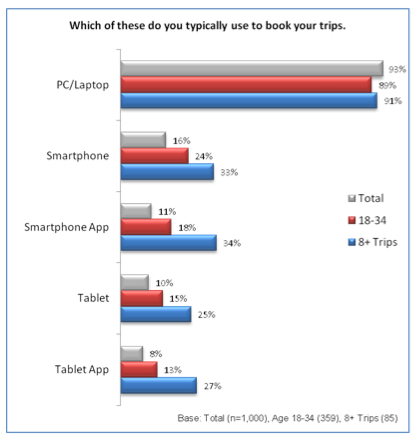 The mobility we enjoy today with airline apps and mobile websites is fantastic, but what does the future hold? A J.D Power survey provided a list of functions airlines are either currently developing or have under consideration and asked travelers which they might use. Here are the results:
The mobility we enjoy today with airline apps and mobile websites is fantastic, but what does the future hold? A J.D Power survey provided a list of functions airlines are either currently developing or have under consideration and asked travelers which they might use. Here are the results:
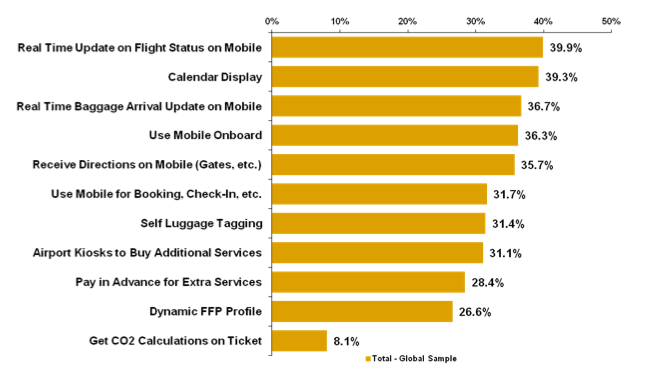 I was surprised the percentages weren’t higher for mobile check-in and flight status updates given their widespread use today. It shows, though, that traditional channels to complete those functions are still in the majority today. The sale of ancillary services via smartphones will likely become reality as the years pass according to the presenters, but are currently processed the majority of time online with mobile devices accounting for only 1.4% of transactions as seen below:
I was surprised the percentages weren’t higher for mobile check-in and flight status updates given their widespread use today. It shows, though, that traditional channels to complete those functions are still in the majority today. The sale of ancillary services via smartphones will likely become reality as the years pass according to the presenters, but are currently processed the majority of time online with mobile devices accounting for only 1.4% of transactions as seen below:
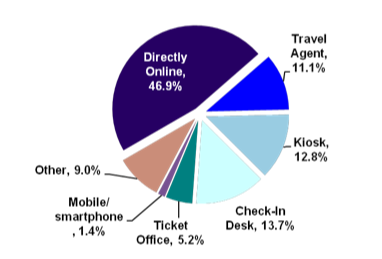 Some of the constraints to bring full service functionality to our mobile devices include integration issues with airline IT systems, cost of development, fragmentation of platforms and mobile operating systems, and the simple fact that not everyone has a smartphone. Full feature phones are still widely used and most can’t necessarily support some of the advanced functions smartphone apps allow.
Some of the constraints to bring full service functionality to our mobile devices include integration issues with airline IT systems, cost of development, fragmentation of platforms and mobile operating systems, and the simple fact that not everyone has a smartphone. Full feature phones are still widely used and most can’t necessarily support some of the advanced functions smartphone apps allow.
The panelists believe we’ll see several new developments go live within the next couple of years, including mobile electronic e-vouchers for airline disservice, airport coupon offers delivered to your phone based on your location in the airport and enhanced & immediate social media responsiveness where a carrier resolves an issue within minutes of contact via Twitter or Facebook, for example. Possibly in five years time we’ll see widespread use of near field communication mobile boarding, mobile payments and interactive video and voice command applications.
It’s an exciting era we’re entering with technology enabling continuous engagement between airlines and travelers across all aspects of the travel life cycle – from pre-trip planning through post-trip feedback and reviews. I look forward to the advancements, but think the timeline for some of the services discussed will be further down the road than presented. Attendees were asked a few instant survey questions during the hour-long webcast, which I think shows why we might not see such advancements as quickly.
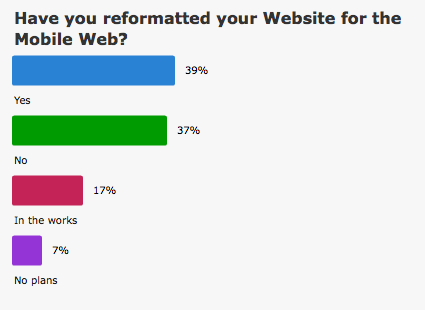
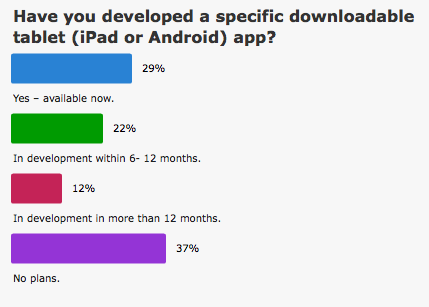
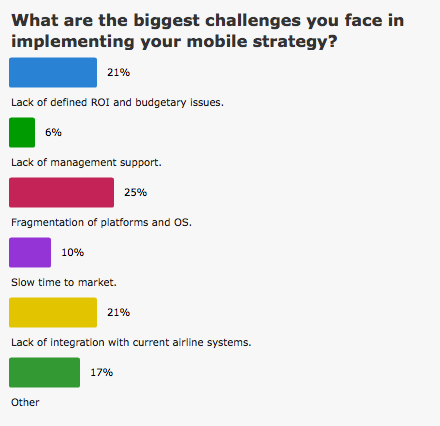 We’ll get there and while it might be slower than hoped among the presenters, I look forward to the efficiency our mobile devices will bring to the air travel experience. It’s simply amazing what we can do today compared to when I began flying regularly. I used mobile check-in for my latest United Airlines trip and will certainly continue to do so in the future. How do you check-in for flights today and what features would you like to see added to existing mobile technologies?
We’ll get there and while it might be slower than hoped among the presenters, I look forward to the efficiency our mobile devices will bring to the air travel experience. It’s simply amazing what we can do today compared to when I began flying regularly. I used mobile check-in for my latest United Airlines trip and will certainly continue to do so in the future. How do you check-in for flights today and what features would you like to see added to existing mobile technologies?


The few times I’ve tried using a mobile boarding pass the person at the security checkpoint had to direct me to another line because their scanner wasn’t working. So now I just print it at the kiosk, but I like the idea of using my phone. I’m sure though as it becomes more pervasive it will work more reliably.
I figure in a few years we’ll have secured, government issued apps and our passport and our drivers license will be on our phone. My prediction: boarding passes AND IDs will be stored on our mobile devices and the airlines will charge you $10 to print out a boarding pass at a kiosk:-)